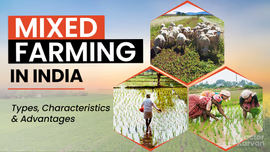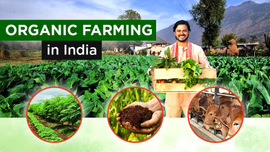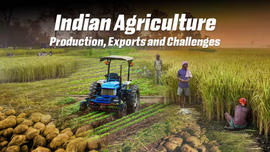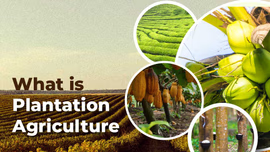Aeroponic Farming: A Soilless Farming Technology

Have you ever heard about “plants growing in air or mist”? Isn’t it interesting? India is performing tremendously amazing in the new technological agriculture farming method. Let’s dive into the world of soilless farming named as “Aeroponics Farming” to know each of its aspect in more detail.
Table of Contents
- An Introduction to Aeroponic Farming
- Need of Aeroponics
- Plants grown in Aeroponic Farming
- Step by Step Guide on Aeroponics System
- Advantages of Aeroponic Farming
- Challenges in Aeroponic Farming
- Difference between Hydroponics and Aeroponics
- Current Status of Aeroponic Farming in India
An Introduction to Aeroponic Farming
India has a traditional agricultural farming method since ancient times. But, Aeroponics Farming is becoming popular in recent years. There has been an amazing interest in this farming method. Aeroponics is a modern method of cultivation in which plants are grown in air or mist environment. In this farming method, the plants are grown without the use of soil that’s why it is also known as “Soilless Farming”. Aeroponics derived from Greek word “aer” (air) and “ponos” (labour). Aeroponics is a type of hydroponics where water mist nutrient sprayed to the roots of plants. It is an intensive way to utilize unused space and increase food production.
Need of Aeroponics
The world population is increasing day by day. The current world population is 8.1 billion and it is estimated that it will reach to 9.6 billion by the end of 2050. With the increase in the population day by day, the demand for food is also increasing. Due to overpopulation, the land area is decreasing. UN estimates that double of the people living now in cities will live in cities which is almost 80% of total population. Ensuring food security of cities will not only depend upon conventional farming. So, this is the most important need to adopt aeroponics farming.
Urbanization is another important reason for adopting aeroponics farming. Area for cultivation in urban areas are rarely found and is not enough for traditional farming methods. Because it takes longer period for harvesting, production per unit area is also very low to fulfil the need of urban population. Here, we need to adopt aeroponics farming because it takes less space and is an intensive way to utilize unused space and increase food production.
Plants grown in Aeroponic Farming
Aeroponics is considered as the best method to grow plants in soil free environment. The plants grown in aeroponics environment are healthier and more nutritious because they are rarely affected to pathogens and are superior in qualities. Let’s have a look on some common plants grown in aeroponics below.
|
Fruits |
Vegetables |
Herbs |
|
Strawberries |
Broccoli |
Basil |
|
Spinach |
Cilantro |
|
|
Melons |
Mint |
|
|
|
Lettuce |
Pepper |
Step by Step Guide on Aeroponics System
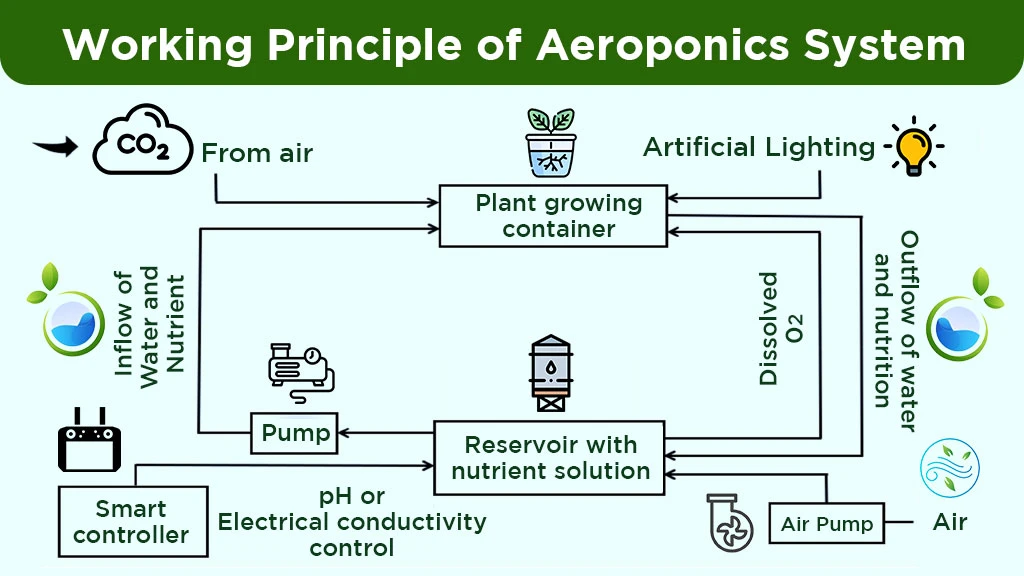
Understanding the working principle of aeroponic system is necessary to grow plants. With this method, plants can grow in an indoor environment reserving the land for some other use. These systems require less space and 95% less water compared to conventional systems. Hence, this method also saves irrigation water. Have a look on the following steps for the better understanding on how aeroponic system works.
- Plants are suspended in the air through an artificial holder in aeroponics systems.
- The roots of the plants need enough nutrients, that is why sprinkler system is used. As a result, roots are exposed to nutrients, oxygen and humidity.
- The leaves of the plants absorb carbon dioxide (CO2) from the air.
- Sunlight or artificial light of LED lamps supply the light energy to the plants for photosynthesis.
- The smart controller keeps the pH and EC of nutrient solution stable.
- A web‐based monitoring system with a data sensing module, management system, communication modules, and actuators tracks the climate data, plant health, and required nutrients to control them with a smart decision‐making system.
- Keeping costs and energy consumption minimum, renewable energy‐driven artificially controlled smart aeroponics systems increases production.
Advantages of Aeroponic Farming
There are many benefits of aeroponic farming. It is less labour-intensive method with minimum crop duration that provides higher yielding. Let’s have a look on some advantages of aeroponic farming below.
- Reduced Water Usage: Aeroponics requires less water to grow crops. It needs very little amount of water when compared to other traditional farming methods. Sometimes, it takes less than 90% of water.
- Increased Crop Yield: There is higher crop yield in aeroponics farming. Its not limit the number of nutrients and water that plant can access which can be seen in traditional farming methods.
- Reduced Fertilizer Usage: Plants receive all the nutrients from water mist so there is no need of fertilizers. Hence, it reduces the cost.
- Reduced Land Usage: As plants grow in the air or mist, there is less use of land as they are designed vertically. This is beneficial in urban area where there is a limited space.
- No Pesticides Needed: Pesticides are not needed in aeroponics because there is no soil for pests to live in. This reduces both the cost and environmental impact.
- Year-round Crop Growth: One of the advantages of aeroponics farming is that crops are grown all year long regardless of weather conditions. This improves food production and provides fresh produce to all the people.
- Increased Crop Safety: There is no risk of crops becoming contaminated with pests and parasites because no soil is needed for aeroponics farming. Hence, it increases crop safety.
- Variety of Crops: Farmers can grow a wide variety of crops like fruits, vegetables, and herbs so aeroponics farming is beneficial to make good profits.
Challenges in Aeroponic Farming
- Environmental Conditions Monitoring: The atmosphere required for aeroponics farming must be continuously monitored and adjusted for the optimal growth of the plants.
- More Expensive: It is difficult to operate and is more expensive than any other type of growing systems.
- Needs Electricity: There is a need of continuous electricity to operate aeroponic system. This can be a challenge in rural area where electricity is not always reliable.
- Crop Contamination: There is a high risk of crop contamination in aeroponics systems, because plants are in direct contact with misting solutions.
- Regular Maintenance: There is a need of regular maintenance because of the complexity of the aeroponics systems. This can be challenging for the farmers who are unaware of the technology.
Difference between Hydroponics and Aeroponics
There is usually a confusion going on in these farming methods. Sometimes, farmers understand that both hydroponics and aeroponics are same farming techniques because in both the mediums the plants are grown in protected indoor environments. But there is a difference between the two. Let’s differentiate and understand both the methods below.
|
Aeroponics |
Hydroponics |
|
Soil less farming technique |
Water less farming technique |
|
Plants are exposed to nutrient-rich mist |
Plant’s roots are in contact with nutrient-rich water |
|
Very little water is needed |
Requires more water as compared to aeroponics |
|
Requires high maintenance |
Needs low maintenance |
|
Less variety of crops can be grown as compared to hydroponics |
Wider variety of crops can be grown. |
Current Status of Aeroponic Farming in India
India is one of the strongest economies in the world. It is one of those country in which 58% of the total production depends on agriculture while 70 % of rural population is still engaged in farming for their livelihoods. But traditional farming methods are not sufficient and it is necessary to adopt new technology to increase food resources to continuously increasing population with urbanization.
India is one of the most diversified countries in the world. It has a diverse climatic condition which make it suitable to grow all type of plants, fruits and vegetables throughout the year. This is the reason why India is 2nd largest producer of vegetables in world but still our country faces food scarcity. The per capita vegetable availability is lower than ICMR recommendation which is 275g and 300g respectively for male and female. In this condition, aeroponics farming is the best way to get fresh produce and it helps to increase the income of farmers.
There is also some schemes and subsidies for aeroponics farming provided by the Govt. of India under the initiative "Development of Commercial Horticulture through Production and Post-Harvest Management", the amount of subsidy is 20 % of total project cost limited to 25 lakhs in general while 30 lakhs in North East region. The government of India also gives the license for aeroponic system for virus free potato seed production to Madhya Pradesh.
Concluding the blog, we can definitely say that aeroponics farming is the most efficient and profitable farming technique which proves as a solution to many critical problems in Indian Farming.
Frequently Asked Questions On Aeroponic Farming: A Soilless Farming Technology
1. Is aeroponic farming profitable?
Yes, aeroponics farming is a profitable farming method as it has higher yield with high quality produce.
2. what is aeroponics farming?
Aeroponics is a modern method of cultivation in which plants are grown in air or mist environment.
3. Is aeroponics better than hydroponics?
Yes, aeroponics farming is better than hydroponics farming as it requires very less water as compared to hydroponics.
4. What are the different types of aeroponics?
There are two types of aeroponics systems namely high pressure aeroponic system and low pressure aeroponic system.
5. What are the techniques of aeroponic farming?
It is a soil less farming technique where crops are exposed to nutrient rich mist which makes it a unique farming technique.
6. What crops are grown in aeroponics?
There is a wide variety of crops that can be grown in aeroponics like fruits, leafy vegetables and herbs.


Related Blogs
